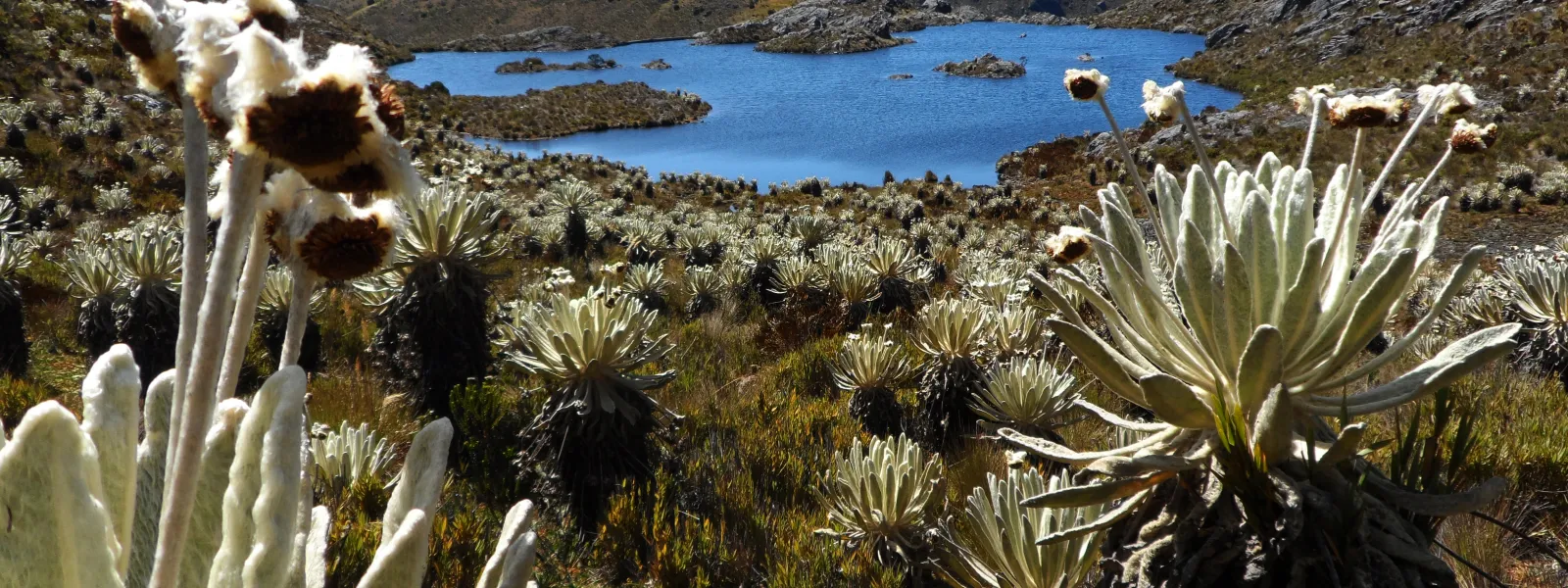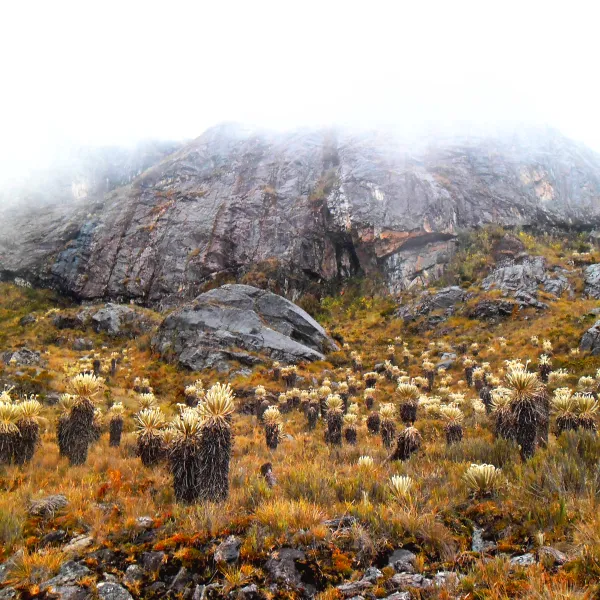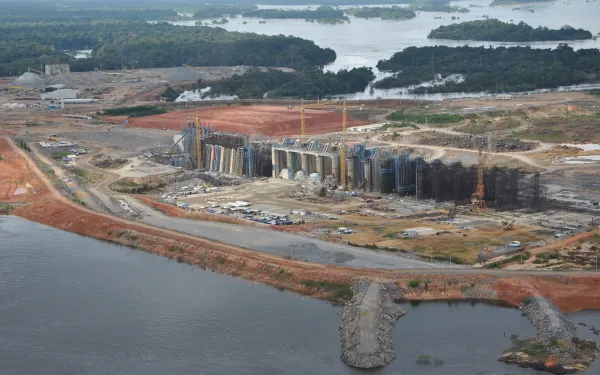
Project
Photo: Alberto Peña KayProtecting the Santurban Páramo from mining's damages
In the Andean region, high-altitude forests and wetlands called páramos capture water from fog and supply it to lowlands. In Colombia, nearly two million people rely on the Santurbán páramo for their freshwater supply.
Healthy páramos also capture large amounts of carbon, mitigating climate change, and provide refuge for hundreds of threatened species, including the iconic spectacled bear.
The land in and around the Santurbán páramo contains gold and other minerals. A Canadian corporation, Eco Oro minerals, wants to build a gold mine that would leak large amounts of cyanide and arsenic into the water coming from the páramo.
AIDA’s advocacy helped to convince the Colombian government to:
- Deny an environmental license for the Angostura mine in May 2011.
- Protect, in 2013, 76 percent of the Santurbán páramo from industrial activities—a much larger percentage than originally proposed
Together with our partners, AIDA advocated for the World Bank's divestment from the Angostura mining project, which we achieved in December 2016.
We also supported litigation that led Colombia’s highest court to reaffirm in February 2016 that mining in páramos is prohibited.
However, 24 percent of the Santurbán remains unprotected because it was not officially designated a páramo during the government's delimitation process, which was invalidated by a court system in November 2017 due to failure to consult with affected communities.
The government must now realize a new delimitation process in consultation with residents of the area. Meanwhile, the threats to Santurbán continue, with Eco Oro still angling to build its mine and another mining project seeking establishment nearby.
Partners:

Related projects
AIDA urges Panamanian Supreme Court to protect water sources
Requested the annulment of a resolution that allows large projects like hydroelectric dams to use up to 90 percent of the water in rivers, lakes and other ecosystems. Panama City, Panama. The Interamerican Association for Environmental Defense (AIDA) has filed a legal brief supporting the lawsuit filed by the Centro de Incidencia Ambiental of Panama (CIAM) seeking annulment of Resolution No. AG-0691-2012, which was enacted by the former National Environmental Authority (ANAM), now the Ministry of Environment. This resolution, which establishes environmental flow, allows up to 90 percent of the water in rivers, lakes, and other natural sources to be used in large projects such as hydroelectric dams. Environmental flow is the minimum amount of water that a river or other channel must contain to maintain its ecological values—refuge for flora and fauna, landscape preservation, and dilution of pollutants, among others—and its social value, or use by communities. The ANAM resolution, annulment of which is sought in the CIAM lawsuit, sets this amount at only 10 percent of an unmodified average for all water bodies and allows the remainder to be used in large infrastructure projects. In its legal brief supporting the lawsuit, AIDA’s primary arguments highlight the Panamanian government’s international legal obligations to protect water resources and guarantee human rights. “We want the judges of the Third Chamber to nullify the resolution, with an understanding of the importance of Panama’s international obligations to maintain an environmental flow that supports the health of aquatic ecosystems and guarantees human rights,” said Haydée Rodríguez, AIDA attorney. AIDA seeks the annulment of the ANAM resolution because it violates the international principles and obligations undertaken by the Panamanian government to protect the biodiversity and rational use of its ecosystems, and to guarantee such human rights as access to water, a healthy environment, and way of life. AIDA also notes that the resolution lacks mechanisms for public participation in the establishment of environmental flow to incorporate the needs of all stakeholders.
Read moreRights of the Environment: The Pope is on our Side
In his speech before the United Nations today in New York, Pope Francis argued passionately in defense of the environment, proclaiming that the natural world should have the same rights and protection as humanity. The Pope insisted on the “rights of the environment” because, according to His Holiness: We human beings are part of the environment. We live in communion with it, since the environment itself entails ethical limits which human actions must acknowledge and respect (…) Any harm done to the environment, therefore, is harm done to humanity… In all religions, the environment is a fundmental good. The Pope also proclaimed the fundamental nature of the fight against climate change, which requires concrete and effective actions. A decisive moment in this fight will come this December at the Paris Climate Conference, where governments from around the world will meet and commit to global actions to confront the climate crisis. The Pope declared: I’m confident that the Paris Conference on climate change will secure fundamental and effective agreements. During the UN General Assembly, before leaders and representatives of the people of the world, the Pope added: Our world demands of all government leaders a will that is effective, practical and constant, concrete steps and immediate measures for preserving and improving the natural environment. This speech is a milestone in the struggle for the defense of the environment and against climate change. It’s yet another push to continue fighting every day for the preservation of biodiversity, ecosystems, freshwater, and the balance of life on this planet, this marvellous creation that we humans share with so many other forms of life. At AIDA we strive every day to defend the right to a healthy environment in the Americas, and in our Climate Change program we monitor and support the negotiations to reach a new global climate accord. As long as humanity and the environment suffer at the hand of irresponsible development, we will continue to fight in defense of the environment.
Read more
Belo Monte noncompliant with conditions for operation, says environmental authority
Altamira, Brazil. In their technical analysis of the Belo Monte Dam released yesterday, the Brazilian Institute of Environment and Renewable Natural Resources (IBAMA) concluded that the conditions required to approve Belo Monte’s Operating License have not yet been met. Ten of twelve conditions identified by IBAMA as pending compliance are considered essential for granting the license. Until the operating consortium, Norte Energía, addresses these conditions, the project will be delayed and the dam’s reservoir will not be flooded. “We welcome IBAMA’s thorough evaluation of Belo Monte, a project that has already had severe impacts on the environment and human rights,” said Astrid Puentes Riaño, co-director of AIDA. “Moving forward, it is crucial that all conditions are met, and measures to protect the people and environment of the Xingú River basin are fully implemented before the license may be granted.” The Interamerican Association for Environmental Defense (AIDA) has for more than 5 years supported indigenous and local communities and organizations in their fight to denounce the irregularities of the Belo Monte project. The conclusions outlined by IBAMA reinforce the arguments of those who have long opposed the dam for its negative socio-environmental impacts. “If the Brazilian government approves Belo Monte’s operating license without first guaranteeing the protection of the environment and human rights, they would be violating their international commitments,” said María José Veramendi Villa, AIDA attorney. AIDA and partner organizations have long argued that conditions do not exist for the approval of licenses for Belo Monte. Essential services that would guarantee minimum rights to the displaced population remain outstanding, including potable water and health and sanitation services. In 2011, the Inter-American Commission for Human Rights granted precautionary measures in favor of affected indigenous communities. The severity of the project’s human rights violations have been reinforced in a report by the Socio-Environmental Institute (ISA) of Brazil, to which AIDA contributed, as well as in information gathered by the health and indigenous protection authorities and the Brazilian Public Ministry. AIDA expects that IBAMA’s technical report will be taken into consideration when making the final decision on the dam’s operating license. The outright denial of the license would serve as a paradigm for future mega-projects planned in the Brazilian Amazon, as well as other parts of the region, sending a clear message that economic development projects must not engage in human rights violations.
Read more